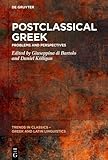Postclassical Greek : Problems and Perspectives / ed. by Giuseppina di Bartolo, Daniel Kölligan.
Material type: TextSeries: Trends in Classics – Greek and Latin Linguistics ; 4Publisher: Berlin ; Boston : De Gruyter, [2024]Copyright date: 2024Description: 1 online resource (VIII, 321 p.)Content type:
TextSeries: Trends in Classics – Greek and Latin Linguistics ; 4Publisher: Berlin ; Boston : De Gruyter, [2024]Copyright date: 2024Description: 1 online resource (VIII, 321 p.)Content type: - 9783111069098
- 9783111079387
- 9783111079172
- 487/.3 23/eng/20240920
- PA1050
- online - DeGruyter
- Issued also in print.
| Item type | Current library | Call number | URL | Status | Notes | Barcode | |
|---|---|---|---|---|---|---|---|
 eBook
eBook
|
Biblioteca "Angelicum" Pont. Univ. S.Tommaso d'Aquino Nuvola online | online - DeGruyter (Browse shelf(Opens below)) | Online access | Not for loan (Accesso limitato) | Accesso per gli utenti autorizzati / Access for authorized users | (dgr)9783111079172 |
Browsing Biblioteca "Angelicum" Pont. Univ. S.Tommaso d'Aquino shelves, Shelving location: Nuvola online Close shelf browser (Hides shelf browser)
Frontmatter -- Preface -- Contents -- List of Figures -- List of Tables -- Problems and Perspectives of Postclassical Greek -- Part I: Periodization and Greek Diachrony -- How ‘Post’ is Postclassical? Lessons from the Augment throughout the History of Greek -- Part II: Greek Dialects and Postclassical Greek -- Dialect Convergence and Linguistic Change: The Dodona Tablets Corpus and its Significance for the Study of the History of the Greek Language -- Part III: Homer and Hellenistic Greek -- ‘Late’ Linguistic Innovations and Elimination of Hiatus in the Homeric Text -- Notes on aemulatio in Hellenistic Epic: Apollonius of Rhodes and the Homeric Language -- Part IV: Language Standardization -- Atticist Views on Linguistic Variation: The Case of Phrynichus’ Eclogue and its Use of Ancient Sources -- In the Mood? – Some Thoughts on the Use of the Optative in Postclassical Literary Greek -- Part V: Historical Semantics -- Postclassical ‘shame’: ἐντρέπομαι and ἐντροπή -- Part VI: Morphosyntax and Biblical Greek -- Negative Concord and Word Order in the Greek Bible and New Testament -- Multiverb Constructions in Postclassical Greek: Pseudo-coordination and Participial Constructions in the Apophthegmata Patrum -- Part VII: The Syntax-Pragmatics Interface -- Double Conjunction Usages in Postclassical Greek -- Word Order in Byzantine Literary Greek -- List of Contributors -- Index Rerum -- Index Verborum -- Index Locorum
restricted access online access with authorization star
http://purl.org/coar/access_right/c_16ec
The present volume collects contributions given at the First Postclassical Greek Conference Cologne (March 24–26, 2021), dealing with different topics related to the Greek language of the Postclassical period. In particular, it addresses the following issues: diachrony of the Greek language (e.g. as regards word order, negation, semantic shifts, counterfactuals); standardization processes; dialect convergence and linguistic change; linguistic innovation vs. reuse in literary Greek; layout of ancient texts in manuscripts. The papers include further elaborations with respect to their discussion within the activities of the DFG scientific network on Postclassical Greek (March 2022 – Feb. 2024) organized by the editors. The thirteen contributions aim at giving the readers new insights into this extremely complex and internally diverse stage of Greek, taking into consideration literary and documentary sources, New Testament Greek and inscriptions. Moreover, they show the productivity of the combination of philological and linguistic approaches when analyzing ancient languages.
Issued also in print.
Mode of access: Internet via World Wide Web.
In English.
Description based on online resource; title from PDF title page (publisher's Web site, viewed 20. Nov 2024)









